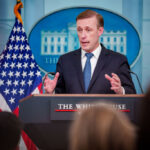Rep. Seth Moulton (D-MA): ‘We have one commander in chief. It’s not Bridge Colby or Pete Hegseth’

Getty Images
U.S. Capitol Building
Members of the House Armed Services Committee sparred on Tuesday at their annual meeting on the National Defense Authorization Act, the massive annual defense and national security policy legislation, over reportedly rogue actions by Secretary of Defense Pete Hegseth and Under Secretary Elbridge Colby to pause U.S. aid to Ukraine without White House knowledge or support.
In debate on an amendment by Rep. Seth Moulton (D-MA) that sought to block Hegseth from halting Ukraine aid without Trump’s direct authorization, Democrats argued that Hegseth and Colby were subverting the command structure, while Republicans dismissed the concerns and insisted that Trump was in full control of the administration’s policy. The amendment failed along party lines.
“I’ve not been a fan of President [Donald] Trump’s Ukraine policy up until this week … but I do believe in the chain of command and the role of the commander in chief,” Moulton said. “Regardless of my disagreements with the president, we have one commander in chief. It’s not Bridge Colby or Pete Hegseth.”
“When the Department of Defense freelances with lethal aid, it sends mixed signals to our allies and emboldens our adversaries,” Moulton continued.
Rep. George Whitesides (D-CA), also calling out Colby and Hegseth directly, said, “decisions of this magnitude do not belong to a single cabinet official with a political agenda.”
Rep. Mike Rogers (R-AL), the committee chairman, responded that “the president is in full control of America’s Ukraine policy. Yesterday’s announcement to accelerate weapon deliveries with NATO support made that crystal clear. Therefore, this amendment does nothing more than add red tape.”
Rep. Pat Fallon (R-TX) said the amendment is “nothing more than political theater,” “sticking the congressional nose where it does not belong” and “a waste of time.” He said that it’s up to Trump to fire Hegseth if he’s dissatisfied with him, but that the cabinet exists to delegate responsibilities.
The committee also voted down, on party lines, an amendment by Rep. Joe Courtney (D-CT) that aimed to block the conversion of a Qatari jumbo jet into Air Force One as well as its transfer to Trump’s presidential library, as well as several amendments related to Hegseth’s transmission of Houthi attack plans on the unsecured messaging app Signal.
The committee approved several amendments relating to the Middle East in bipartisan amendment packages. The amendments request briefings and reports from the administration on potential risks to the Al Udeid airbase in Qatar, which was attacked by Iran last month, the potential for defense partnership with the new Syrian government, the U.S. weapons stockpile in Israel and its replenishment needs and potential integration of the U.S. defense industrial base with Israel.
Those amendments were led by Reps. Ronny Jackson (R-TX), Abe Hamadeh (R-AZ), Elise Stefanik (R-NY) and Joe Wilson (R-SC), respectively.
It also approved three amendments relating to antisemitism as part of amendment packages.
One, led by Jackson, would ban any funding for colleges and universities that have had antisemitic demonstrations and “failed to take action to mitigate and prevent” future ones, as defined by the International Holocaust Remembrance Alliance’s working definition of antisemitism.
A second, led by Rep. Sarah Elfreth (D-MD), would require a report on antisemitism training and efforts to combat antisemitism inside the Pentagon.
The third, by Rep. Eugene Vindman (D-VA) would request a report on “the threat posed by violent antisemitism as a component of transnational extremist movements,” including the spread of their ideologies and propaganda, the threat they pose to U.S. and the history of violence motivated by antisemitic ideologies.
The bill includes provisions establishing a new program pursuing defense applications of technologies like artificial intelligence, cybersecurity, quantum computing and automation with Israel and other partners; authorizing the U.S. to maintain its weapons stockpile in Israel and its counter-tunnelling cooperation program with Israel through 2028; and expanding an existing U.S.-Israel counter-drone and missile cooperative program to include other types of unmanned systems in addition to airborne threats.
It proposes $35 million for the emerging technology cooperation program, $50 million for anti-tunneling cooperation and $70 million for counter-unmanned systems cooperation, a $15 million boost.
The bill also requests a briefing on the findings that Western components have been used in Iranian attack drones, in spite of sanctions and export restrictions, and ways that the problem can be addressed.
The committee rejected an amendment from Rep. Nancy Mace (R-SC) that would have eliminated Ukraine aid in the bill by a voice vote, and voted 47-10 in favor of an amendment by Rep. Adam Smith (D-WA) that would boost Ukraine aid by $100 million, bringing the total to $400 million.
The Senate Armed Services Committee’s version of the NDAA was also released on Wednesday. That bill includes the same extension of counter-tunneling programs through 2028, but proposes increasing funding to $80 million. It proposes increasing funding for the existing counter-drone and missile program to $75 million, and also extends that program through 2028. It provides $15 million for emerging technology development with Israel.
The Senate bill also instructs the Defense Department to work to provide additional “training, equipment, logistics support, supplies, and services” to Jordan and Lebanon to protect their territorial security.
Amid debate over withdrawing troops from Syria, the Senate bill would require the Defense Department to certify that withdrawing or reducing U.S. troop presence in Syria would not compromise U.S. priorities. It also instructs the Pentagon to “take appropriate measures to support the defenses” of camps in Syria holding ISIS prisoners and report to Congress on the subject.
As previously reported by Jewish Insider, the bill also pushes to advance Middle East air defense integration.
The GOP lawmakers’ comments come after the president, taking a tougher line against Putin, overruled top Defense Department officials

BRENDAN SMIALOWSKI/AFP via Getty Images
US Under Secretary of Defense for Policy Elbridge Colby (R) and US Secretary of Defense Pete Hegseth look on during a meeting with Foreign Affairs Minister of Peru Elmer Schialer and Defense Minister of Peru Walter Astudillo at the Pentagon in Washington, DC on May 5, 2025.
Senate Republicans on Tuesday emphasized that Trump administration officials need to follow the president’s lead on foreign policy, after President Donald Trump publicly overrode a Defense Department-instituted halt on weapons for Ukraine.
The public back-and-forth indicated discord between the president and the Pentagon. Trump on Tuesday appeared to suggest he was out of the loop about the Ukraine military freeze; when a reporter asked him who had ordered the halt, Trump responded, “I don’t know, you tell me.”
Top Pentagon policy official Elbridge Colby reportedly led the move, citing a review allegedly showing U.S. missile defense interceptor shortages. Secretary of Defense Pete Hegseth approved the decision without informing the White House, CNN reported, and Trump did not specifically direct him to halt the weapons transfers. Politico reported that a series of other unilateral moves by Colby have surprised and frustrated Trump administration officials and U.S. allies.
Trump’s own policy on Ukraine as it defends itself against Russian aggression has been inconsistent since taking office, but in recent months he has grown publicly frustrated with Russian President Vladimir Putin’s approach to the war. Trump is now also backing a bipartisan Senate sanctions bill targeting Russia, according to the bill’s lead sponsor, Sen. Lindsey Graham (R-SC).
Republican hawks on Capitol Hill praised Trump’s decision to reinstate U.S. aid to the country, with several warning Pentagon officials against working at cross purposes with the president, though they declined to directly address the behind-the scenes machinations.
“Policy on defense and otherwise, it’s clear, is set by the president, it’s not set by his underlings,” Sen. John Kennedy (R-LA) told Jewish Insider, adding that he thinks that Trump’s own position on the issue has hardened because “President Trump is rapidly becoming fed up with President Putin and starting to see him for what he is, which is a pirate and a liar” who only responds to pressure.
Kennedy denied that the Pentagon had been at odds with Trump, however, adding, “Whether you like it or dislike it, the people who generally get crosswise with the president that work for him only do it one time.”
Sen. Thom Tillis (R-NC) told JI, “Generally speaking, I don’t think [Trump] likes people getting out ahead of him. So they need to coordinate that. I assume they did, it could have just been one situation, but you need to coordinate with the president.”
Tillis added that “anything that cuts short or challenges Ukraine’s resupply and support is a bad idea, and it’ll be a disastrous mistake.”
Sen. Mike Rounds (R-SD) told JI, “I’m in favor of additional aid for Ukraine. Whether it is simply a matter of having the Department of Defense get very clear orders from the president, or if it’s a matter of clarifying for the rest of the world to hear that we’re not walking away from Ukraine, I think it’s a very important message to send.”
Sen. Mitch McConnell (R-KY), the former Republican Senate leader, offered the most pointed criticism of those in the administration who have advocated for cutting off aid to Ukraine.
“This time, the President will need to reject calls from isolationists and restrainers within his Administration to limit these deliveries to defensive weapons,” McConnell said in a statement. “And he should disregard those at DoD who invoke munitions shortages to block aid while refusing to invest seriously in expanding munitions production. The self-indulgent policymaking of restrainers — from Ukraine to AUKUS — has so often required the President to clean up his staff’s messes.”
According to Politico, Colby independently ordered a review of the AUKUS submarine pact with the U.K. and Australia, which also surprised other elements of the Trump administration.
Sen. Roger Wicker (R-MS), the chair of the Senate Armed Services Committee, declined to comment on “palace intrigue” and said he was “just glad to see Washington, D.C., on a bipartisan basis moving in the right direction in favor of the good guys.”
“Facts become clearer, and more and more people, including the president and members of the administration, are coming to the realization that Putin wants nothing but conquest, and if he gets it in Ukraine, he won’t stop there,” Wicker told JI. “So it’s just a matter of the truth coming to light.”
Sen. Ted Budd (R-NC) suggested that the change had come about as a result of new information, rather than discord within the administration.
“Well, I think all of us have the right to change your mind when you have new information, so he’s not happy with the situation,” Budd said. “Again, I think all of our hearts are supportive of Ukraine. We want to make sure they have the right leadership, and transparency that they’re doing the right thing. So I think he’s making the right decision with the information that he’s given in real time.”
Sen. Markwayne Mullin (R-OK) said he wasn’t familiar with the exchange between Trump and the Pentagon, but noted concerns about U.S. stockpiles.
“I don’t know what the back-and-forth is,” Mullin said. “I know what we’re trying to do right now is build up our stockpiles, because we let things get pretty low with some of our missile systems, but I haven’t heard the back and forth between Trump and the Pentagon.”
Among Democrats, Sen. Jeanne Shaheen (D-NH), the ranking member of the Senate Foreign Relations Committee, called out Colby and Hegseth by name.
“I am pleased that President Trump appears to have reversed course on the dangerous and shortsighted decision made by Secretary Hegseth and Under Secretary Colby to continue critical assistance to Ukraine,” Shaheen said in a statement. “Unfortunately, last week’s decision sent exactly the wrong message. And it came with a tragic human cost.”
Analysts outside the administration emphasized that Trump’s policy is his own and hard-liners inside the Pentagon should be mindful that their views are not necessarily the same as Trump’s.
“I think over the last few years, it has been very, very clear that the only person who speaks for President Trump is President Trump,” Carrie Filipetti, the executive director of the Vandenberg Coalition and an official in the first Trump administration, told JI. “There are a lot of people, specifically within the Pentagon, that are much more ideological, who have assumed that President Trump shares their ideology, when really President Trump has always been much more flexible and responsive.”
Filipetti added that, from her experience in the first Trump administration, the president could get frustrated when officials “tried to speak for him” or “got over their skis and assumed that they knew the direction he was going in.”
She said that the administration’s recent moves, as well as some of Trump’s hawkish policies dating back to his first administration, show that the calculated use of force and economic power are key to Trump’s foreign policy.
“This is really a vindication of what Trump has always said was America First, which includes the willingness to use force if he can see how it will prevent a longer-term conflict,” Fillipetti explained. “Right now, I think the people who have pushed for a more hawkish policy are gaining more influence, partially because they’re proving that the goal was never to start wars. The goal was to end wars by using force and strength as a deterrent.”
Heather Conley, a nonresident senior fellow at the American Enterprise Institute and the former president of the German Marshall Fund, said it seemed clear that the Pentagon had not coordinated its moves with other parts of the administration or Congress, catching the White House off-guard.
“I think this was probably a very important lesson that the senior leadership in the Pentagon learned: that there’s no independent review, that these things are all connected and are all highly political and need to be coordinated with the White House, and Congress, most certainly, as well,” Conley said. “I think this will be a reinforcing lesson for the Pentagon to not get ahead of the president.”
Referencing Colby specifically, Conley said, “He may have very strong views about what is needed, but the president is shaping this policy, he’s shaping it every hour and every day, and that means it’s moving very quickly. … [Administration officials] have to be in alignment for there to be success. And they also may not be able to pursue their own independent view of where things should go.”
Conley said that the capability review that prompted the cutoff was necessary — given proper coordination — for any administration, in light of the multiple draws on American weapons reserves.
She said that the situation highlights the need for the U.S. to significantly accelerate its missile-defense production capacity and find ways to prompt Ukraine to expand its domestic production capacity, explaining that the U.S. lacks the ability to produce sufficient interceptors to cover Ukraine, the Middle East and potentially Taiwan.
Conley also noted that this isn’t the first time the Pentagon has appeared to be acting out of step with the White House, pointing to moves by Hegseth on Ukraine policy dating back to February.
Administration spokespeople have denied any discord or lack of coordination within the administration.
Kingsley Wilson, the Pentagon’s press secretary, told CNN in a statement that said in part, “Secretary Hegseth provided a framework for the President to evaluate military aid shipments and assess existing stockpiles. This effort was coordinated across government.” White House press secretary Karoline Leavitt said that Trump “has full confidence in the secretary of defense.”
The Department of Defense and National Security Council did not respond to requests for comment.
Jewish Insider’s congressional correspondent Emily Jacobs contributed reporting.
Republicans blocked a bid to pass similar legislation in the Senate

Jeff Swensen/Getty Images
Rep. Jared Moskowitz (D-FL), a member of the Task Force on the Attempted Assassination of Donald J. Trump, speaks to the press after touring the shooting site at the Butler Farm Show Grounds on August 26, 2024 in Butler, Pennsylvania.
A group of four House Democrats introduced legislation on Wednesday that aims to exempt Israel and Ukraine from the recent global tariffs that President Donald Trump imposed by executive order.
Trump announced a 17% tariff on Israel in April, above the global 10% minimum tariff that the president said he would apply to U.S. trading partners.
The Trump administration is “alienating some of our closest allies around the world, including those that are currently facing aggression from hostile nations,” Rep. Jared Moskowitz (D-FL), the bill’s lead sponsor, said in a statement. “I support efforts to increase domestic manufacturing, but those efforts shouldn’t come at the expense of our global standing, our national security, and the strength of our economy. Congress has to stand up to the destruction these tariffs are threatening against American families and our allies Israel and Ukraine, and I’m leading the charge to do it.”
The bill is co-sponsored by Reps. Sheila Cherfilus-McCormick (D-FL), Dan Goldman (D-NY) and Josh Gottheimer (D-NJ).
Moskowitz accused the administration of placing on Americans “the largest tax increase since 1968” through the tariffs, describing them as “a tax on American families that makes goods inaccessible, threatens retirement accounts, and takes a sledgehammer to U.S. economic growth.”
The legislation is a companion to a bill Sen. Catherine Cortez Masto (D-NV) introduced in early April. She sought unanimous consent in the Senate at the time to pass the bill, but was blocked by Republicans.
“Both these countries are currently under attack. They need the United States to be standing with them, not hitting them with nonsensical tariffs that could cause them even more harm,” Cortez Masto said at the time. “It is outrageous that my Republican colleagues blocked an opportunity to fix this and come together to protect our allies.”
Some Republicans have been critical of the administration’s decision to place tariffs on Israel, particularly since Israel announced it would lift all of its own tariffs on the United States, but most have opposed efforts by Democrats in the Senate to force votes on legislation to block the tariffs.
The administration has delayed the implementation of tariffs and multiple federal courts have ruled that the president does not have the unilateral authority to impose them.
Ukrainian and Israeli officials say the annual gathering at the gravesite of Rabbi Nachman of Breslov on Rosh Hashanah could become a hotspot for coronavirus

Gage Skidmore
U.S. Congressman Jeff Duncan speaking with attendees at the Conservative Review Convention at the Bon Secours Wellness Arena in Greenville, South Carolina.
Rep. Jeff Duncan (R-SC) has begun to circulate a letter among his House colleagues calling for the Trump administration to pressure the Ukrainian government into allowing religious exemptions for Jews looking to make their annual pilgrimage to Uman, Ukraine, for the Jewish holiday of Rosh Hashanah. The move comes amid a strict border closure by Ukraine designed to stop the spread of the coronavirus in the country.
The House letter is addressed to Secretary of State Mike Pompeo and asks him to “consider advocating on behalf [of] a group of American citizens whom find this annual pilgrimage extremely important.”
Duncan’s office distributed the letter, obtained by Jewish Insider, to other Capitol Hill offices for signatures late Friday afternoon. His office did not immediately respond to a request for comment.
The Ukrainian border closure extends through September 28, Yom Kippur. The letter references a number of exceptions in the current order, and states that all of the visitors would pay to test themselves upon arrival and would quarantine apart from the local population.
“The Ukrainian government could add a limited religious exception allowing for a small fraction of the regular attendees (not to exceed 2000 people) to enter the country for a total of five days,” the letter to Pompeo reads.
In recent years, as many as 30,000 Orthodox Jews have made the annual trek to Uman to visit the gravesite of Rabbi Nahman Breslov around the Rosh Hashanah holiday.
Israel’s coronavirus commissioner, Ronni Gamzu, has been vocally opposed to this year’s pilgrimage, predicting that it could prompt a major spike in coronavirus infections. Gamzu asked Ukrainian President Volodymyr Zelensky last week to ban Israeli pilgrims from entering the Eastern European nation, prompting public clashes between Gamzu and several ultra-Orthodox politicians in Israel.
The pilgrimage has already become a flashpoint between local Ukrainian residents and visitors, with a scuffle breaking out between residents, local authorities and pilgrims earlier on Friday. Following Ukraine’s border closure, some pilgrims also found themselves stranded at Ukrainian airports on Friday.






























































